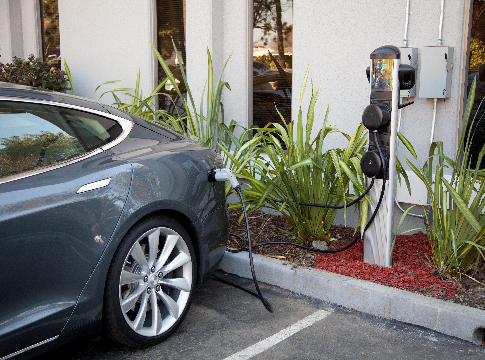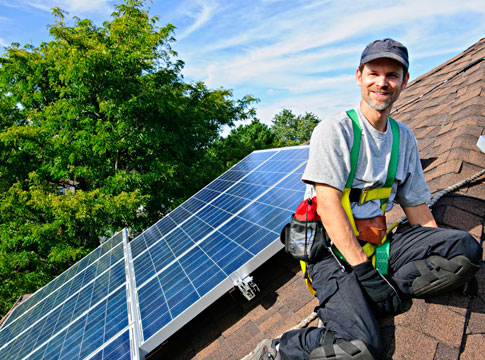Questions?
Email our energy experts or call 541-685-7088 for more information.
In addition to the cost savings you'll get from driving an EV, you may qualify for EWEB rebates and state and federal tax credits.
Smart Charge rebates for electric vehicle public charging infrastructure
EWEB aims to expand Electric Vehicle Supply Equipment (EVSE), commonly called "charging station", in our community through our Smart Charge rebates for qualifying public charging stations.
Our rebates support the following types of stations:
Funding for this program is in part made possible by the Oregon Clean Fuels Program (CFP) administered by the Oregon Department of Environmental Quality (ODEQ).
Installing an EVSE can be highly variable in scope and costs. Visit our Charging Options page to learn more.
Steps to participate
- Start working with an electrician/contractor and determine if the current electrical service capability is sufficient or if potential upgrades are needed to support the EVSE installation. Contact EWEB Distribution Engineering at distributionengineering@eweb.org to communicate the potential addition of new load from your charging station project. The added electric load of installing EV charging stations may result in costs for upgrading facilities such as transformers, conductors, or other equipment upstream from your service. If the EWEB engineering analysis confirms that equipment must be upgraded to accommodate the added electric load, the Customer will be responsible for these charges related to upgrading the equipment, per EWEB Electrical Utility Operational Policies. This is a separate process from the commercial Smart Charge rebate program.
- Select EVSE to be installed.
- Apply now. You can print a paper application here.
- An account manager will contact you to review your project.
- Receive EWEB pre-approval for your project. Pre-approval reserves funding for the proposed project.
- Install the EVSE.
- Submit EVSE spec sheets, and copies of the invoices for the qualifying EVSE (hardware and software) and installation work.
- Submit documentation of any applicable and additional grants or rebates from other entities and/or programs; the EWEB rebate is not to exceed 100% of the cost of the EVSE (hardware and software) and its installation, including any additional grants or rebates that decrease the total project cost.
- Applications and supplemental documents can be emailed to ems.answers@eweb.org.
EWEB may request a pre or post-inspection of the project to verify compliance with program requirements. The rebate check will be sent directly to the applicant 4-6 weeks after approval.
Smart Charge rebates for commercial grade level 2 public stations
As a business or multifamily owner, having a public level 2 electric vehicle supply equipment (EVSE) can help increase the convenience and affordability of driving electric for your employees, customers, and tenants. Level 2 EVSE can provide 20 plus miles of driving range per hour of charging. Learn more about level 2 charging stations and developing infrastructure to charge plug-in electric vehicles. We offer the following rebates:
- New commercial grade public level 2 EVSE for business, workplace, fleet, or multifamily housing site buildings (5 residence units or more) may qualify for a $1,500 rebate per port.
- New commercial grade level 2 EVSE for qualified multifamily affordable housing sites may be eligible for a $2,000 rebate per port.
Qualifications for Level 2 EVSE and port
- Applicant must have the authority to direct and install.
- An application must be submitted to EWEB within 120 days from the date of installation.
- Must be commercial grade EVSE; residential grade units do not qualify.
- Must be installed at the applicant's business, workplace, or multifamily housing site address. Multifamily must be a site with 5 or more residence units. Multifamily affordable housing sites must qualify under the City of Eugene and/or State of Oregon's definition; qualification will be verified after application submittal.
- Installation site can be existing or new construction.
- Rebate is not to exceed 100% of the cost of the EVSE (hardware and software) and its installation, including any applicable and additional grants or rebates from other entities and/or programs that decrease the total project cost.
- Must be 208/240V with power output capacity of 30 amps minimum per port, and equipped with the SAE J1772 or NACS connector plug.
- In the case of a multiple-port EVSE, the rebate can apply to each port only if users charge simultaneously at full capacity (30 amps minimum) on each port . If charging capacity is reduced when multiple ports are in use, the additional rebate does not apply per port.
- Must be network-connected capable and demand response capable. EVSE network must be Open Charge Point Protocol (OCPP) compliant, and adhere to the Open Automated Demand Response (Open ADR) standard.
- Must be certified and listed under a Nationally Recognized Testing Laboratory, including Underwriters Laboratories (UL) or Electrical Testing Laboratories (ETL).
- Installation must be permitted, inspected, and approved in compliance with the National Electric Code along with local, county and state requirements. It is the customer's responsibility to ensure the installation is done in compliance with applicable codes. Installations should be performed by a licensed electrician.
- Resold, rebuilt, received from warranty insurance claims, third party-owned, or awarded as a prize or grant, are not eligible for rebates under this program.
- Parking spaces should be marked and reserved for active plug-in electric vehicle (POV) charging only.
- Features and technologies that help users monitor its utilization and location should be implemented.
Apply now. You can print a paper application here and send completed applications via email to ems.answers@eweb.org

Smart Charge rebates for direct current fast charging public stations
Direct current fast charging (DCFC) electric vehicle supply equipment (EVSE) offer rapid charging speeds of over 100 miles of driving range per hour of charging. Learn more about DCFC stations and developing infrastructure to charge plug-in electric vehicles. We offer the following rebates:
- New single-port DCFC public EVSE may qualify for a $10,000 rebate per station.
- New multi-port DCFC public EVSE may qualify for a $15,000 rebate per station.
Qualifications for DCFC EVSE and port
- Applicant must have the authority to direct and install.
- An application must be submitted to EWEB within 120 days from the date of installation.
- Must be installed at the applicant's business, workplace, or multifamily housing site address. Multifamily must be a site with 5 or more residence units. Multifamily affordable housing sites must qualify under the City of Eugene and/or State of Oregon's definition; qualification will be verified after application submittal.
- Installation site can be existing or new construction.
- Rebate is not to exceed the 100% of the cost of the EVSE (hardware and software) and its installation, including any applicable and additional grants or rebates from other entities and/or programs that decrease the total project cost.
- Must have a power rating of at least 50 kW per port and equipped with a CCS, CHAdeMO, or NACS connector plug.
- Must be network-connected capable and demand response capable. EVSE network must be Open Charge Point Protocol (OCPP) compliant, and adhere to the Open Automated Demand Response (Open ADR) standard.
- Must be certified and listed under a Nationally Recognized Testing Laboratory, including Underwriters Laboratories (UL) or Electrical Testing Laboratories (ETL).
- Installation must be permitted, inspected, and approved in compliance with the National Electric Code along with local, county and state requirements. It is the customer's responsibility to ensure the installation is done in compliance with applicable codes. Installations should be performed by a licensed electrician.
- Resold, rebuilt, received from warranty insurance claims, third party-owned, or awarded as a prize or grant, are not eligible for rebates under this program.
- Parking spaces should be marked and reserved for active plug-in electric vehicle (POV) charging only.
- Features and technologies that help users monitor its utilization and location should be implemented.
Apply now. You can print a paper application here and email it to ems.answers@eweb.org.
Clean Fuels Program
Entities providing public charging, including workplace, fleet, business and multifamily may qualify for additional revenue generation through the Oregon Department of Environmental Quality Clean Fuels Program. The program allows EVSE operators to generate Clean Fuels credits, which can then be monetized. This is not an EWEB program. Visit DEQ's Clean Fuels Program website or contact OregonCleanFuels@deq.state.or.us to learn more.
Oregon Clean Vehicle Rebate Program
The Oregon Department of Environmental Quality's Oregon Clean Vehicle and Charge Ahead Rebate programs can save Oregonians up to $7,500 on the purchase or lease of a qualifying electric vehicle. All Oregonians can receive up to $2,500 for the purchase or lease of a qualifying new EV. Low- and moderate-income Oregonians can save an additional $5,000 on qualifying new or used EVs. Learn more and download an application on DEQ's website.
If you are purchasing or leasing your car from a dealer, you may be able to receive your rebate at the time of purchase. DEQ has developed an interactive map to locate dealerships with this arrangement in place.
Community Charging Rebates
The Oregon Department of Transportation's Community Charging Rebates Program, helping to fund Level 2 electric vehicle projects in Oregon's communities, opens its next funding round on March 5, 2024 at 9 a.m.
The rebate program reimburses some of the project costs of buying and installing Level 2 EV charging stations at multifamily homes, workplaces, and publicly accessible parking areas. The rebates range from $4,500-$5,500 per charging port or up to 75% of eligible project costs, whichever is less.
Visit the Community Charging Rebates Program webpage for more information, including guidelines, webinars, qualifications, and application details.
Community Charging Rebates can be stacked EWEB EV charging infrastructure rebates.
Federal tax credit
The federal government's Zero Emission Vehicle Incentive Program means each automaker's eligible plug-in vehicles can receive a tax credit of up to $7,500 (based on vehicle battery size) until 200,000 eligible vehicles per manufacturer are registered in the U.S. After this point, the credit for that particular vehicle will be reduced and phased out over time.
As of April 2019, Tesla, Cadillac, and Chevrolet have reached 200,000 sales, so models now have a reduced tax credit value.
In addition, home or business installations of electric vehicle charging stations can receive a tax credit of up to 30 percent of the cost of installation. For more information about claiming the credit, see IRS Form 8911, which is available on the IRS Forms and Publications website.
Related Programs
We offer rebates and loans to help your business save money through energy and water efficiency.



